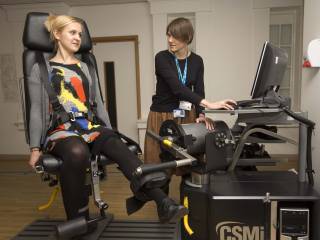Our patients have a thorough and detailed history taken and clinical examination. This is a vital part of assessment and enables us to decide on the next best step in your management. This can include:

- Blood tests-including creatine kinase, acid maltase blood spot, and metabolic tests.
- Electrodiagnostics-including McManis protocol exercise EMG and nerve excitability studies
- Muscle biopsy with genetic, histochemical, immunocytochemical and enzymatic analyses
- Skin biopsy with fibroblast culture for metabolic disorders
- Muscle MRI
- Ischaemic/non-ischaemic lactate test
- Genetic testing from blood and muscle samples where appropriate
Treatment
Upon receiving your diagnosis, there are several pharmaceutical and non-pharmaceutical options for treatment:
Pharmaceutical
| Myotonia | Mexiletine |
| Periodic paralysis | Dichlorphenamide and Acetazolamide |
| Mitochondrial disease | Ubiquinone |
Non-pharmaceutical
Treatment options include specialist neuromuscular orthotics and physiotherapy input.
We also offer patient social support through our Clinical Nurse Specialists.
They specialise in:
- muscle channelopathies
- neuromuscular respiratory failure
- transition patients
- myotonic dystrophy
- facioscapulohumeral muscular dystrophy
- mitochondrial disease
Immuno-suppression monitoring is also provided by a nurse specialist service.
 Close
Close

